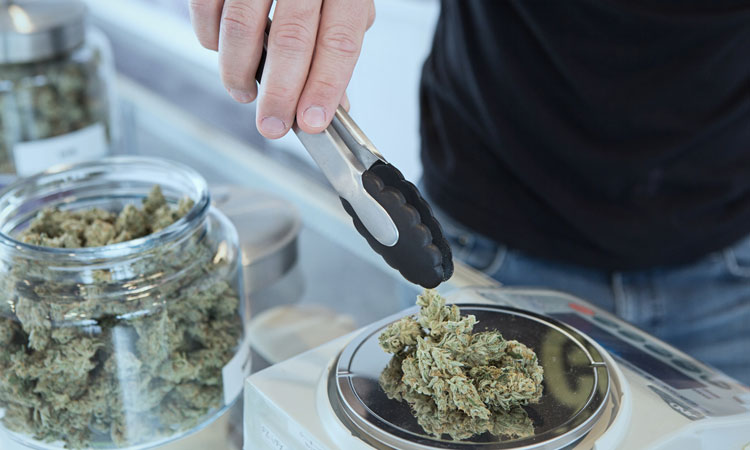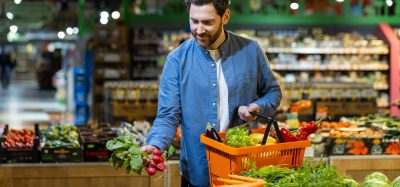Cooking with cannabis
- Like
- Digg
- Del
- Tumblr
- VKontakte
- Buffer
- Love This
- Odnoklassniki
- Meneame
- Blogger
- Amazon
- Yahoo Mail
- Gmail
- AOL
- Newsvine
- HackerNews
- Evernote
- MySpace
- Mail.ru
- Viadeo
- Line
- Comments
- Yummly
- SMS
- Viber
- Telegram
- Subscribe
- Skype
- Facebook Messenger
- Kakao
- LiveJournal
- Yammer
- Edgar
- Fintel
- Mix
- Instapaper
- Copy Link
Posted: 20 November 2020 | Bethan Grylls (New Food) | No comments yet
New Food’s Editor speaks to Vanessa Labrecque about the culinary delights of cannabis.


Speaking of the backdrop against which her company was born, Vanessa Labrecque, Co‐Founder of The Cannabis Cooking Company, explained it was when cannabis had just been legalised in Canada, but the pre‐packaged edibles now familiar to the nation were not yet available.
“There were TV shows such as Cooking on High and people could legally buy cannabis flower or concentrate to cook with at home, but there wasn’t anyone teaching how to cook with this ingredient safely,” she told New Food.
Labrecque and her business partner, Joshua Tuck, have both been growing cannabis for some time, so were happy that the plant had found its way to the mainstream food sector. However, they were equally concerned by a lack of education. “People who were new to cannabis and didn’t want to smoke it, did not have access to edibles via Government. However, they were able to cook with it,” she recalled. “But there were no specialised cookery classes at the time; you had your online videos…but nothing reliable.”
Cannabis is a volatile ingredient and if misused can have potentially unpleasant or even dangerous effects. “It’s not just a case of throwing some cannabis in food and hoping for the best!” Labrecque noted. “It’s a careful, mathematical process.”
This led the duo to establish The Cannabis Cooking Company in 2018 – to fill the knowledge gap and satisfy the emerging at‐home culinary cannabis market.
“We launched our website and even before we released our schedule, we had this incredible response. Everyone wanted to know what we were up to. We didn’t expect it to become so popular so quickly!”
Speaking of the backdrop against which her company was born, Vanessa Labrecque, Co‐Founder of The Cannabis Cooking Company, explained it was when cannabis had just been legalised in Canada, but the pre‐packaged edibles now familiar to the nation were not yet available.
“There were TV shows such as Cooking on High and people could legally buy cannabis flower or concentrate to cook with at home, but there wasn’t anyone teaching how to cook with this ingredient safely,” she told New Food.
Labrecque and her business partner, Joshua Tuck, have both been growing cannabis for some time, so were happy that the plant had found its way to the mainstream food sector. However, they were equally concerned by a lack of education. “People who were new to cannabis and didn’t want to smoke it, did not have access to edibles via Government. However, they were able to cook with it,” she recalled. “But there were no specialised cookery classes at the time; you had your online videos…but nothing reliable.”
Cannabis is a volatile ingredient and if misused can have potentially unpleasant or even dangerous effects. “It’s not just a case of throwing some cannabis in food and hoping for the best!” Labrecque noted. “It’s a careful, mathematical process.”
This led the duo to establish The Cannabis Cooking Company in 2018 – to fill the knowledge gap and satisfy the emerging at‐home culinary cannabis market.
“We launched our website and even before we released our schedule, we had this incredible response. Everyone wanted to know what we were up to. We didn’t expect it to become so popular so quickly!”
The cannabis audience
Labrecque believes it was the legalisation of cannabis that led to the explosive market we see today. “Before this, a lot of people wouldn’t go near cannabis because it was classed as a drug; they were told it was bad for them” – and, of course, it was illegal.
However, once its status changed, further research gleaning greater information about the plant and its alleged medicinal benefits began to emerge. With this, people started to understand more about cannabis, and it began to transform into something that was widely acceptable. It was a moment that instigated the first steps towards the more positive connotations it holds today.
Many of The Cannabis Cooking Company’s initial students were people who had never before used cannabis, according to Labrecque. “They were curious about the ingredient and wanted somewhere they felt safe, where they could receive a proper education.”
She explained that the idea behind the business wasn’t just to educate consumers on safety, but to facilitate a platform for them to learn the different ways it can be used.
“In my opinion, the Government missed the mark with how they rolled out edibles,” she contended. “Currently, the most popular products are gummies, chocolates, sweets – there are limited healthy options.
So, along with providing a safe, educational platform for cannabis cooking, we wanted to teach people how to create healthy, nutritious food with cannabis.”
Labrecque believes gummies were a natural ‘go‐to’ because they’re easier – ie, more accessible – and safer for the everyday consumer. “You know exactly what dose is in a gummy,” she elaborated, “when you’re cooking with cannabis it is tricky to regulate.” She hopes that through The Cannabis Cooking Company, consumers can be empowered to confidently create safe and healthy options at home.
Chef certification and trust
The business model for The Cannabis Cooking Company quickly developed, introducing a bespoke chef course, which aimed to increase professional cooks’ confidence in this niche ingredient. “We recognised that there wasn’t – and still isn’t – a cannabis‐specific standard for chefs and we wanted to change that.”
Labrecque acknowledged that developing trust between their clientele and the cookery school was imperative. Of course, Tuck and herself had extensive knowledge regarding cannabis but they appreciated that further credibility of their business’ know‐how would be required, particularly when it came to professionally geared classes. As such, the team swiftly expanded from the duo to include a red seal cannabis chef and a cannabis sommelier.
How to cook with cannabis
Cannabis can be an unpredictable ingredient, necessitating a good understanding of chemical reactions and maths. “The person who is cooking needs to know how to cook with portions in mind – you do not want to serve a bowl of spaghetti and have one guest consume a larger dose than the others. The effects of eating cannabis are around six times stronger than inhaling and it lasts longer.”
At The Cannabis Cooking Company, students bring their own cannabis flower to class – with the experts advising on what kind of cultivar (strain) to purchase.


Bhang (culled from cannabis leaves and buds) is strongly tied with the Hindu festival known as Holi
“There are endless cultivars of cannabis and each has a unique terpene profile – an aroma, if you will,” explained Labrecque. “The terpenes not only dictate how the cannabis will make you feel but also the flavours of the dish. For example, there are terpenes that are more earthy, while some are fruity.
“The choice of ingredient we’re cooking with will dictate what kind of terpene profile we want to use. A lemony terpene would be good for a citrus dessert, for example.”
As part of its offering, the class covers areas such as common terms and labels, decarboxylating and how to create an oil with the flower. The process of decarboxylation is essentially how the cannabis is ‘activated’. As the cannabis is gently and slowly heated, the inactive THCA converts into THC, the psychoactive component. “It is important not to apply high heat, as this will burn and remove the cannabinoids,” Labrecque explained.
To create the oil, The Cannabis Cooking Company uses MagicalButter machines – a mechanical botanical extractor that blends, heats, stirs, grinds and steeps the contents. These are arguably a quicker and easier alternative to the traditional method, which involves using a double boiler: basically, a bowl positioned over a pan of simmering water whereby the cannabis slowly diffuses into the oil.
The MagicalButter machine produces a butter, which is then strained in micron bags, separating the oil from the plant matter, which is later discarded. The students are left with cannabis‐infused oil, which they are then taught to use in their cooking. Due to its sensitivity to heat, the point at which the oil is incorporated into dishes is very important, noted Labrecque.
The future of fine dining?
One day, Labrecque hopes to see cannabis become a mainstream feature on restaurant menus, with patrons opting for a cannabis‐infused meal instead of a glass of wine. “Cannabis has evolved from the ‘pot brownie’ and I can envision it becoming more of a fine dining experience,” she mused.
Despite her optimism, Labrecque pointed out that uncertainty and fear around cannabis edibles remain; she highlighted that particular future opportunities, such as the fine dining experience, may be halted due to the Government’s wariness.
Of course, we’d be naïve to think that cooking with cannabis is a new concept and the plant deemed a ‘gateway drug’ in all cultures. In India, for example, consumption dates back to 1000 BC. Bhang (culled from cannabis leaves and buds) is strongly tied with the Hindu festival known as Holi (the festival of colours), which celebrates spring, love and new life.
This type of cannabis has become a big part of the Hindu culture and has long been considered a medicinal herb that eases anxiety. Using a mortar and pestle, the buds and leaves are crushed and ground into a paste. Milk, ghee and spices are then mixed with the paste and served either as a drink or as green edibles known as ‘golees’.1
With cannabis an integral part of other cultures and the legalisation of cannabis in Canada and several US states, it begs the question whether more western cultures will follow suit. The UK has already seen a sharp spike in CBD and hemp sales, so it’s certainly not unimaginable to foresee this region introducing similar legislation.
Perhaps Labrecque’s dream of cannabis menus will extend way beyond Canada… we’ll just have to see.


Vanessa Labrecque is the Chief Executive Officer and Co-Founder of The Cannabis Cooking Company. She oversees all major business operations, including kitchen management, personal relations, marketing, team management, administrative tasks and event planning. Her goal is to break the stigma of the cannabis user and educate the world about cannabis.
Reference
- www.holifestival.org/tradition‐of‐bhang.html









